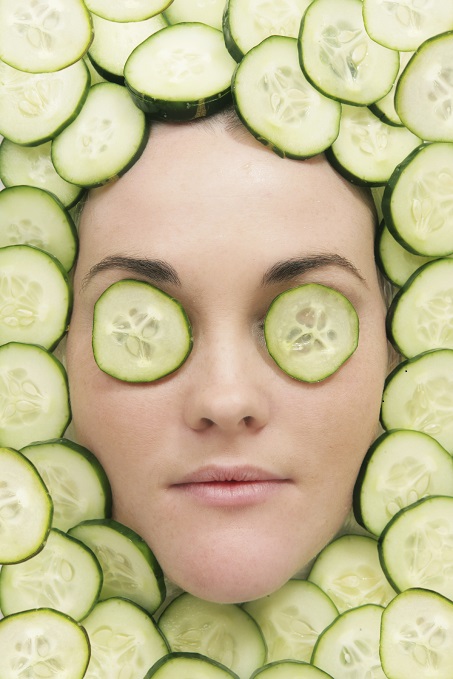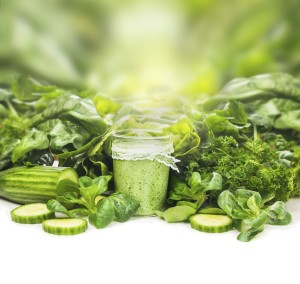 Among people who are interested in having healthy skin, there’s a big trend for cutting up cucumbers and sticking them to your face.
Among people who are interested in having healthy skin, there’s a big trend for cutting up cucumbers and sticking them to your face.
Sleep deprivation is common these days and one very smart person discovered an old Chinese legend, the legend that putting cucumbers on your face helps to reduce insomnia. Women in particular went crazy for this trick and reported in that the Chinese were correct after all.
Inevitably, everyone began to wonder if the cucumber could have other benefits, and began to try cucumber flesh for skin ailments. Cucumber has long been famous for reducing the appearance of puffy eyes and they theorised that it can reduce our friend acne too.
Many people have reported that cucumbers have indeed helped their skin, and it’s certainly not out of the realms of possibility, so read on and find out whether the science backs it up…
How is cucumber supposed to work?
The theory is similar to many other natural treatments: cucumbers contain nutrients, antioxidants, and other beneficial substances, which are absorbed into your skin and supposedly soothe your acne.
Proponents claim that through this method cucumbers can help to reduce inflammation of the skin and give it a far healthier look. There is nothing wrong with this method; your skin does absorb beneficial substances very well. In this article we discussed how some of the beneficial substances in honey get absorbed into your skin. However the real question is whether cucumber actually contains any beneficial substances in the first place…
…and it doesn’t contain many of the classic micronutrients. Cucumber has a wide variety of nutrients but it only contains tiny amounts of each of them. 25 grams of cucumber contains 0.7mg of vitamin C, equally tiny amounts of b-vitamins, only trace amounts of zinc, 26IU of vitamin A (a tiny amount), and small amounts of vitamin K. It also contains no vitamin E, which is one of the best vitamins to have in a topical treatment.
These tiny amounts of nutrients will help your skin if absorbed, but the difference will be so miniscule that it will be impossible to notice.
Read Annihilate Your Acne – get the ultimate diet and clear your acne permanently!
As for antioxidants, the ORAC score is the widely used system of measuring antioxidants and cucumbers only score a measly 140. This is small compared to many berries, at roughly 4000, apples, also at 4000, and pomegranates, which score over 10,000.
This level of antioxidants will certainly provide some benefits, but it’s clearly nothing special. Another good sign that a food contains many antioxidants is if it lowers oxidative stress when consumed. Foods like strawberries, broccoli, sweet potatoes, red wine and many other vegetables all have several studies showing that they lower oxidative stress. Those foods are all known to be high in antioxidants.
Meanwhile, there are almost no studies showing beneficial effects of cucumbers on oxidative stress. One good measure of a food’s medicinal properties is how often it’s discussed in your newspaper. You might see raspberries being praised in the media one week for improving weight loss, and the next week you might correspondingly see a raspberry ketone supplement being touted for the same purpose.
Blueberries, broccoli, and coconuts are all frequently praised in the media as being superfoods. Cucumbers, however, are almost never discussed, and that’s simply because there isn’t anything to discuss.
Cucumber is not famous for anything special; it is just a bag of water (90% of its content) that only contains tiny amounts of healthy substances. It is entirely possible that cucumbers contain an undiscovered acne-clearing substance, but the same could be true for any other food.
What do the studies say?
 There haven’t been any studies on cucumber and acne. If we want real world evidence then we can look at anecdotal reports from acne patients – which are surprisingly positive. There are numerous reports of people reducing pimples simply by mashing up cucumber and applying it to their face.
There haven’t been any studies on cucumber and acne. If we want real world evidence then we can look at anecdotal reports from acne patients – which are surprisingly positive. There are numerous reports of people reducing pimples simply by mashing up cucumber and applying it to their face.
Some stories include…
-Acne scars that have faded away to nothing.
-Reduced dryness and flakiness of skin.
-Reduced redness and swelling.
How can this be?
If you simply look at the ORAC score and the nutritional content of cucumbers then you’d think that they are utterly useless. But you could easily say the same for honey. Honey has an ORAC score of 270, which is not great, and it only contains tiny amounts of nutrients, but its real benefits come from the antibacterial properties.
The top 7 topical treatments for clearing acne naturally
Cucumber may fall into the same boat. This study found that cucumbers may have antibacterial properties; it found that cucumber volatiles, a key chemical produced by the cucumber to defend itself, exhibited strong antibacterial activity against four different strains of bacteria. It’s possible that this compound helps acne by reducing p. acnes bacteria in the same way honey and blue light devices do.
It certainly makes sense, given that many anecdotal reports describe a reduction in redness and swelling. However, this is only one study; further studies could find no antibacterial activity. It does suggest that there is more to cucumber than first appears and it could explain why people notice benefits with it.
Nevertheless, there’s no evidence to support cucumbers and you can’t just rely on testimonials. People often imagine results in the hope they are working, and in many cases, testimonials are planted by drones employed by supplement companies in a relentless attempt to drive sales.
How does cucumber compare to other treatments?
We can’t fully compare cucumber to other treatments because it has been researched a lot less, but we can draw some preliminary conclusions. We know for certain that cucumber is very low in nutrients and antioxidants, so if your goal is feeding those to your skin then other treatments will be better.
Aloe vera is higher in both nutrients and antioxidants and even food peels are a lot better. In fact you’d do much better by simply putting pomegranate juice on your face as this is extremely high in antioxidants; a pomegranate scores 10,000 on the ORAC scale. Grapeseed oil and sea buckthorn oil are rich in vitamin E and vitamin A respectively.
Recommended – the top 6 vitamins and minerals for acne-free skin
Cucumbers may have good antibacterial activity but I still recommend picking honey, or blue light devices if you’re wealthy, precisely because of the lack of research. There are dozens of studies showing that honey is strongly damaging to a wide variety of bacteria, whereas we only have one study showing that cucumber is damaging to some.
It is entirely possible that cucumbers are just as damaging to p.acnes, but because we have no way of telling it is best to stick to honey.
Finally, consider the fact that cucumber does not have the storied history of other treatments. Honey has been known to have medicinal properties for thousands of years; it was referenced in the Bible, the Egyptian Pharaohs loved it, and numerous other cultures valued it for treating wounds. Aloe vera was also used in many ancient civilisations including Ancient Egypt.
Meanwhile cucumbers are famous for being a zero calorie vegetable that’s almost entirely made up of water. There’s only two legends associated with cucumber that I can find 1) the Chinese one claiming that it can help you sleep, and 2) that Cleopatra used cucumber as part of a skin treatment.
Cucumber is clearly inferior when you consider the centuries of praise that other treatments have enjoyed.
PS: this proves nothing, but history is always a great source of evidence.
Conclusion – should you be using cucumber?
The answer is: you can certainly try cucumber if you want to. Cucumber is still clouded in mystery, so it could cause a massive improvement in your acne. You never know; you may be one of the people who notices great benefits from it.
But if you don’t have the urge to experiment, then I suggest you don’t bother as the evidence we do have suggests that cucumber is a pretty poor vegetable. There are testimonials in favour, but a lot of the reviewers seem to be more in love with the cucumber smell of the products rather than the actual effects of them.
Your best option is to stick to a classic natural acne treatment like honey, grapeseed oil or sea buckthorn oil, as they have far more verified benefits. Even most food peels will work a lot better as they are often rich in nutrients (like the potato peel).
To conclude, cucumbers may work but they probably do not live up to the hype.
Are cucumbers healthy to eat?
There’s a chance that cucumbers can help your skin topically but there’s hardly any chance that eating them will do the same. The antibacterial properties will not help your skin as they will not reach your face, the nutrients are almost non-existent and the antioxidant levels are tiny.
Cucumbers really are just a bag of water with few benefits. The only potential advantage is that they fall into the zero calorie vegetable family; you can thus obtain what benefits they do have without disrupting your overall diet (carbs, sugar, calories, etc.).
Such vegetables are useful because you can eat large quantities of them without problems. But if you want a vegetable to eat tons of then you’d be better off picking celery, which is a lot more nutritious, is also a “zero-calorie” vegetable, and contains many nitrates that can accelerate wound healing.
Cucumbers will not harm your skin but they are useless and buying them will waste money, when you could be spending it on supplements or healthy organic foods. Only eat them if you are a real fanatic.
NEXT: get the complete strategy for clearing acne naturally
Thanks for reading!
